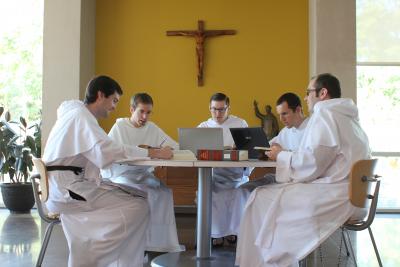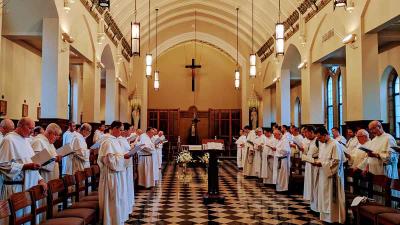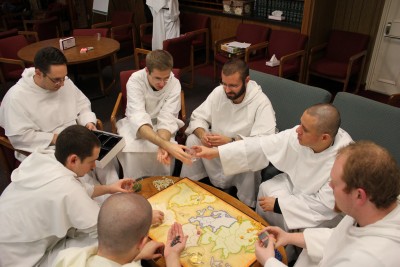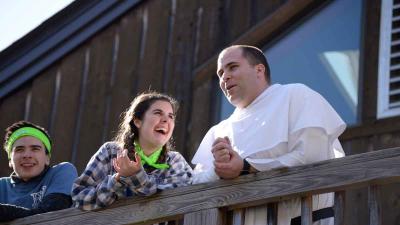The Four Pillars of Dominican Spirituality
Dominicans, tens of thousands of us, have been around for 800 years. Our rich spirituality binds us together and distinguishes us from other religious orders. The most telling attributes are sometimes characterized as the “Four Pillars of Dominican Life”—Prayer, Study, Community, and Preaching—inspired by the example of St. Dominic, said to be always “talking to God or talking about God.” Other distinctions include those revealed in the lives of our Dominican saints and the place of the Blessed Virgin Mary in the history of the Order.
We seek to balance these four aspects of our lives in order to serve God in the best possible way. It is this balance that constitutes the "Holy Preaching" through which we most effectively proclaim the Good News of Jesus Christ.
Study
St. Dominic made study an essential part of the Holy Preaching, no small accomplishment in the 13th century realm of uneducated clergy. With the blessing of Pope Honorius III, St. Dominic sent friars to the great universities of his time to study and to preach in these great centers of learning. This practice continues today.
The primary object of Dominican study is the Word of God revealed through Scripture, Tradition, and the natural world, whose fullest manifestation is the very person of Christ himself.
Knowledge sought for its own sake is certainly a worthy pursuit, but Dominican study seeks to make us useful for the salvation of souls—ours and our neighbors—a spiritual work of mercy. Study facilitates a more effective proclamation of the truth and is motivated by love of God and love of neighbor.
For a Dominican, study is the work of a lifetime. We attend to the Church’s rich teaching, individually and collectively, drawing especially from the wisdom of our own brother, St. Thomas Aquinas. His concern for reasoned argument, attention to counter arguments and alternative viewpoints, remain powerful incentives—as is the crucial insight that God, in Christ, desires our knowing, trusting, friendship. This lifetime of study finds meaning only when we share what we have learned with others.
Study, coupled with prayer, ensures both heart and mind remain closely connected. We cannot love what we do not know. We grow when sustained by what we learn of God’s majesty, generosity, and mercy. Theology provides food for contemplation, the fruits of which we then communicate to others through preaching.
Prayer
We Dominicans center our lives on Jesus Christ, the true Light, moved by the Holy Spirit radiating God’s healing presence in the world today. We celebrate the Word in daily common prayer, meditation, study, and in the proclamation we call the Holy Preaching. In imitation of the Mother of God, who pondered these things in her heart, our lives are nourished by God’s Word as spoken in Sacred Scripture, celebrated in the Eucharist, and encountered in everyday life.
In faithful response to the invitation of St. Dominic, the solemn, common celebration of Mass and the liturgy of the hours remain the center of our daily life. There, especially in the Eucharist, salvation is present and at work, a mystery we share, contemplate and proclaim to others that they as well may be incorporated into Christ through the sacraments of faith. During each celebration of liturgy, we intercede with the Father of mercies for the entire Church, as well as for the needs and the salvation of the whole world.
As exemplified by some of our great saints, Dominicans also encounter God both in the world in which we live and in contemplative silence. St. Albert the Great, a 13th century Dominican who held a strong belief that all truth is ultimately one, pioneered the study of the natural world as integral to understanding God in all his diversity. Albert’s insights contributed to the establishment of modern science not as something distinct from theology, but in necessary mutual dialogue. In the midst of mystical contemplation, another Dominican, St. Catherine of Siena, had conversations with Jesus that were so profound and important they led her to Rome and to Avignon to engage in challenging conversations with the Pope.
Though quite different from each other, St. Albert the Great and St. Catherine of Siena are both considered Doctors of the Church and represent important aspects of Dominican prayer. Each friar balances the contemplative and the active dimensions of Dominican life. This balance is something for which we continually strive, not something we achieve once and for all.
Common Life
We live together in large (as many as 30 friars) and small (as few as 2 or 3 friars) communities; not just living together under one roof, but as brothers sharing our lives with one another. The communal dimension of Dominican life challenges us to be of "one mind and one heart in God." Profession into the Order of Preachers includes the promise to hold all things in common. We live together, pray together, own all things in common, and share a common vision in the ministry of preaching. St. Dominic invites us to imitate the apostolic poverty of Jesus and the early church, so "we call nothing our own" so that we can more easily share our blessings with the rest of the world.
Through a vowed life, we make public promises to live according to the ideals counseled by Jesus. Our vow of poverty calls us to live a simple life, free from the need to possess many things. When we vow chastity, we freely forego life with a spouse and family, allowing each of us freedom to witness to the bountiful love of God for every person. Our vow of obedience helps us to be of greater service to the Church, freeing us from the need to always have the last word about what we will do and where we will live. The vowed life is an exciting, fulfilling challenge.
Preaching
Friars serve the Church preaching the name of Jesus Christ wherever we are called to serve. While it seems obvious that the Church should have an Order devoted to itinerant preaching, at its founding Dominic’s Order was revolutionary. The preaching of wandering lay preachers in the 13th century was often unorthodox and not sanctioned by the Church. "Serious" religious people (monks) remained in one place; mostly in monasteries. In turn, Dominicans saw themselves following the example of Christ and his apostles, living simply and wandering the world spreading the Good News.
As preachers, Dominicans share in the ministry of bishops, the successors to the apostles. At their beginnings, the Dominicans were given authority to preach everywhere by Pope Honorius III.
Preaching invites us to absorb mysteries which remain always beyond our grasp, propose truths we will not master until the end of time, and provoke our very selves to pray, to think, and to love relentlessly. Then, we seek words to express this lived tension that will benefit others. Preaching is a graced vocation for those who, assisted by the Spirit of Truth, respond to the Gospel call to "make disciples of all nations."




